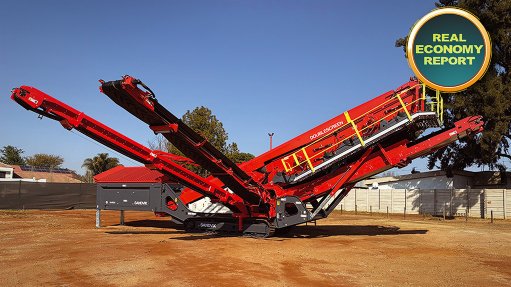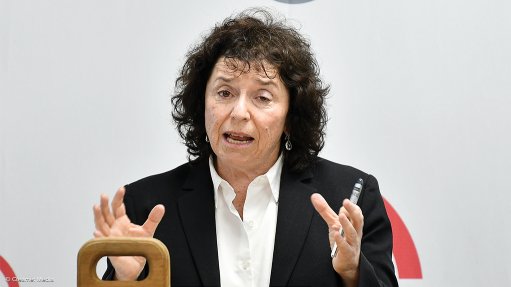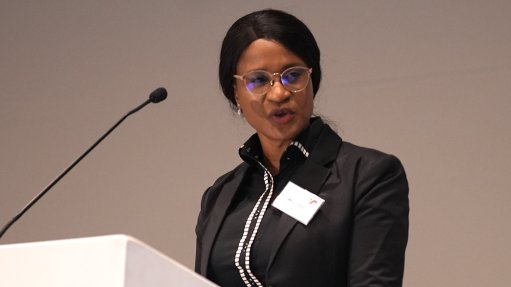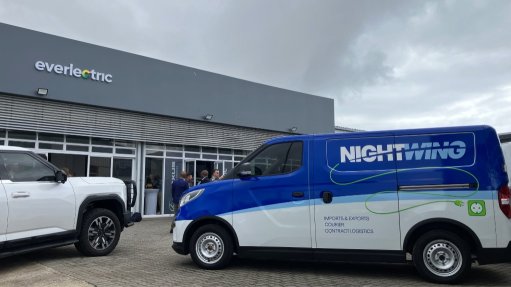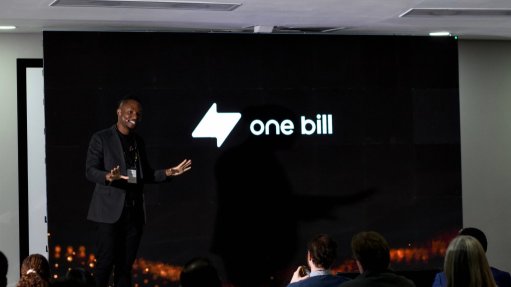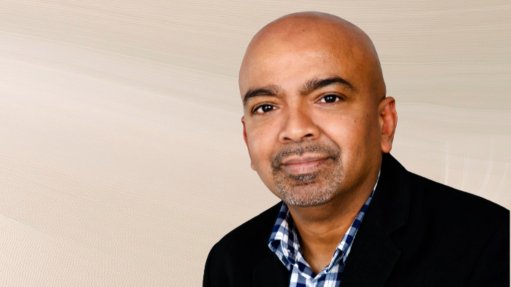When Africa's resources run out, who will need her?
This article has been supplied.
As with most emerging economies, South Africa and Africa have significant economic potential that remains unexplored, but it is how that potential is leveraged that will determine the ability for these economies to rise above their current challenges,” writes GIBB Group CEO, Vishaal Lutchman.
South Africa and Africa need to move beyond a resource-based economic discussion towards a value-add discussion. This is because resources are a finite commodity. When the resources run out, who will need Africa? If Africa does not transition its economies and ecosystems, how will it survive and thrive?
This is more significant now than ever for a few reasons: firstly, time is needed to transition which may take more than 50 years if commencing today; secondly, skills and education ramp-up to build capacity may take a generation, if not longer; and thirdly, because so many economies are in crisis mode and don’t have the headspace to consider long-term visions, this could remain a talking point without any action.
Currently, about 16-million people in South Africa are supported by between five- and six-million taxpayers and the country’s unemployment rate continues to rise, at 32.9% for the first quarter of 2025. With a Gini coefficient of 63%, South Africa ranks as the country with the lowest level of equality in the world.
There is no ‘quick fix’ to South Africa’s economic woes, recently underlined by the nett closure of 482 businesses in the first four months of the year, according to Statistics SA.
In this respect, key structural reforms that promote fundamental transformation in the economy must be urgently put into place to unlock the country’s potential in a meaningful and sustainable way. This requires a short-, medium- and long-term approach (long-term does not mean nothing happens now).
This must be done while acknowledging that South Africa and many other countries on the continent are hindered by their colonial pasts, resulting in an inequitable balance of trade. The current global trade volatility will always have a negative impact on vulnerable emerging economies; negating gains made in the interim.
South Africa and most of its neighbours are buying economies with a significant emphasis on primary activities such as selling raw commodities and buying finished products, meaning they are not adding as much value to their own economies as is possible, exacerbating the unemployment narrative. These geographies simply must produce more value-added products for domestic and international consumption. This type of value-added production creates socioeconomic ecosystems that have a significant multiplier effect, ushering in much-needed new revenues to the fiscus.
Value resides - in the medium term - in structural reform discussions, but short-term initiatives also need to be addressed. In the past, South Africa was able to add value to the infrastructure it needed to advance the mineral extraction to foreign markets through organisations such as the South African Iron and Steel Industrial Corporation (ISCOR), which manufactured steel to supply to the country’s rail system. Secondly R&D was a phenomenon that was appreciated by many organs of state.
Today the country buys rail components from other geographies because they are “cheaper”. I argue if this is really the case – have we accounted for the socio-economic cost of these decisions versus the financial opportunity in the projects? If correct, this suggests the country is risking short-term financial gain over long-term economic losses by perpetuating the current economic ecosystem with the hope of achieving socio-economic liberation.
The structural reforms that would apply relate to policy. The cost of rail is currently being viewed through a narrow lens: rail per ton is more expensive to produce in South Africa than to import from China or Austria. However, the country has not factored in the socio-economic cost – the loss of jobs and steel production expertise – or the value add associated with the beneficiation of raw materials – its own raw material and that of its neighbouring countries.
One way to address the country’s value proposition is to import partially completed goods and transform them into finished products for export. The country has established several special economic zones (SEZs), or custom bonded areas, set up specifically to become key economic drivers. But they are not being leveraged, and many have not realised the potential value.
South Africa is also not including youth-owned firms in the infrastructure procurement process. The current procurement regime requires a BEE certificate proving black ownership, but there is a need to focus on youth-owned firms and encourage women-owned firms to participate directly in infrastructure projects, ideally relating to infrastructure maintenance work, a potential quick win.
Young entrepreneurs could then employ individuals to support them in their businesses instead of the other way round. This is a way to establish an ecosystem around maintenance in the places where service delivery is failing, and boost youth-owned business - as much of the maintenance work is relatively easy to teach.
Additionally, digital transformation of the procurement process is a must. The manipulation of South Africa’s procurement system has not been addressed. It is often not transparent, and the country has not made inroads into digitising its system. This needs to change, especially given that many other countries have already done so to enable the achievement of job creation without the phenomenon of maleficence in procurement transactions.
And, with Development Finance Institutions being automated, the country could go even further by using a human-free procurement process. Technology already exists for this, or it can be developed at a relatively low cost in country.
It is important to note that sustainability covers four areas – economic, environmental, social and cultural. South Africa is focused on the first two, economic, where the money resides, and environmental, due to pressure to support the Paris agreement.
However, socio-economic disparities between developed and emerging economies require a nuanced approach to sustainability, which must be customised for regions. The adoption of imported technology needs to be considered carefully due to prevailing geo-political headwinds.
The cultural pillar is not seen as a revenue generating pillar and is largely neglected. This is problematic, especially for countries such as South Africa where communities were influenced through cultural alterations over time, resulting in changes to their living spaces, religions, history and languages, to name a few. This erosion or alteration of culture has led to some communities feeling aggrieved.
This is important in so far as infrastructure is planned in a highly standardised way – often a one-size-fits-all approach – contributing to unsustainable communities from a cultural perspective. The community development projects need to incorporate additional facets such as access, schools, play areas, green areas, economic activities, retail, connectivity in data, religious facilities, and other municipal services to ensure communities are connected and can access mainstream economies easily.
So, what strategic investments should South Africa be making to overcome these challenges?
Strategic investment is the consequence of a strategy. In South Africa, the strategy has centred around the National Development Plan, with the preamble to the constitution suggesting this investment must be focused on reparations – the need to redress the past must remain.
One recommendation is that strategic investment should be about strategy on two fronts: firstly, addressing the needs of the most vulnerable people in society and secondly, investing in revenue-generating projects as part of a socio-economic ecosystem. The latter needs a greater focus.
The country’s constitutional intention is to fix inequality. There is still significant opportunity to do so in the creation of new markets in support of growth - via intra-Africa trade and building relationships in the Southern African Development Community (SADC).
South Africa’s focus on social reparations was the key at the start of the democratic journey which meant that much effort was put into social welfare, power and water education, and health etc. Those investments were necessary, however, there was to a lesser extent a commensurate focus on topline growth of the economy with regards to value-add and industrialisation.
In the process, maleficence has also hurt the growth narrative and deprived many of a better life. Here, economic ecosystems can come into play, providing a lens to view the development journey through. The word ecosystem has been used deliberately – to separate it from the ‘projects/programme’ narrative.
The limitation of projects is that they look at financial value, without necessarily creating socio- economic ecosystems. An economic ecosystem should have multiple pillars that consider all the sustainability criteria.
As African societies, we should stop thinking that we cannot cope without someone else’s help. This brings the concept of Pan-Africanism to the fore: where part of the solution may reside with Africans solving African problems for themselves. It’s about being proudly African and working as a collective.
For now, only 16% of trade is conducted with neighbouring countries on the continent. While the country cannot renege on its existing trade agreements, it is possible to grow that 16% by promoting a higher level of intra-Africa trade supported by an industrialisation / value adding approach.
Inter-America trade is at 50% and inter-EU trade is at 80%. This means there is potential to create a new growth narrative to support the construction of sustainable socio-economic ecosystems and so to sustainable communities. As altruistic as it may sound, it is achievable with the right leadership in place.
Comments
Press Office
Announcements
What's On
Subscribe to improve your user experience...
Option 1 (equivalent of R125 a month):
Receive a weekly copy of Creamer Media's Engineering News & Mining Weekly magazine
(print copy for those in South Africa and e-magazine for those outside of South Africa)
Receive daily email newsletters
Access to full search results
Access archive of magazine back copies
Access to Projects in Progress
Access to ONE Research Report of your choice in PDF format
Option 2 (equivalent of R375 a month):
All benefits from Option 1
PLUS
Access to Creamer Media's Research Channel Africa for ALL Research Reports, in PDF format, on various industrial and mining sectors
including Electricity; Water; Energy Transition; Hydrogen; Roads, Rail and Ports; Coal; Gold; Platinum; Battery Metals; etc.
Already a subscriber?
Forgotten your password?
Receive weekly copy of Creamer Media's Engineering News & Mining Weekly magazine (print copy for those in South Africa and e-magazine for those outside of South Africa)
➕
Recieve daily email newsletters
➕
Access to full search results
➕
Access archive of magazine back copies
➕
Access to Projects in Progress
➕
Access to ONE Research Report of your choice in PDF format
RESEARCH CHANNEL AFRICA
R4500 (equivalent of R375 a month)
SUBSCRIBEAll benefits from Option 1
➕
Access to Creamer Media's Research Channel Africa for ALL Research Reports on various industrial and mining sectors, in PDF format, including on:
Electricity
➕
Water
➕
Energy Transition
➕
Hydrogen
➕
Roads, Rail and Ports
➕
Coal
➕
Gold
➕
Platinum
➕
Battery Metals
➕
etc.
Receive all benefits from Option 1 or Option 2 delivered to numerous people at your company
➕
Multiple User names and Passwords for simultaneous log-ins
➕
Intranet integration access to all in your organisation











